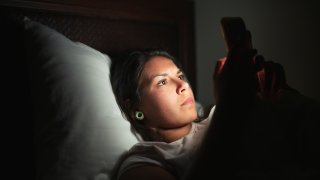
Many find themselves avoiding bed by scrolling through social media, bingeing TV shows or enjoying a hobby that keeps them up until the wee hours of the morning. The next day, they wake groggy and exhausted. Yet that night they push back their bedtime — again. While bedtime procrastination isn’t new, revenge bedtime procrastination has emerged as a way for some to rebel against creeping demands on their free time.
“A new aspect of it is people’s motivation and that is, in part, because there are more things they want to do. Their sleep is not considered a priority,” Philip Richard Gehrman, associate professor of clinical psychology in the psychiatry department at the Perelman School of Medicine the University of Pennsylvania, told TODAY. “The only thing that is different about revenge bedtime procrastination is the idea of people using it as a way of gaining a sense of control over their schedule.”
As the COVID-19 pandemic continues and work and school invade home life, many feel like they have little input in how they spend their time. Revenge bedtime procrastination gives people the feeling that they do still have some power.
“That’s the way to say, ‘OK I’m going to exert some control over my schedule and to be able to spend it the way I want to spend it rather than just being subjected to the external forces around me,’” Gehrman explained.
Get San Diego local news, weather forecasts, sports and lifestyle stories to your inbox. Sign up for NBC San Diego newsletters.
Psychologists often work with patients who struggle to go to bed or fall asleep. Often people just do not properly estimate how long something might take them and they’d work late into the evening. Almost everyone falls victim to poor time management at some point.
“Managing time during the day can be hard. There’s only a finite number of hours, there’s a lot of stuff we have to get done. If you don’t maintain good boundaries or have a system set up where you’re sharing responsibilities, it can get to the end of the day where you’re exhausted,” C. Vaile Wright, senior director for health care innovation at the American Psychological Association, told TODAY. “Sometimes people are doing it as a way of avoiding the next day, even though the next day, of course, is going to come.”
U.S. & World
But Helena Rempala said the pandemic has added a new motivation for some who put off sleep — anger.
“It may be related to the fact that people are frustrated and just generally often angry that they cannot do what they want or that plans are falling through,” the clinical psychologist at the Ohio State University Wexner Medical Center told TODAY. “Anger is a very informative emotion. It tells you, ‘I don’t like it. It’s not fair.’”
Feeling angry might mean that even though people know they should sleep they just won’t. But the practice is self-defeating.
“If you’re angry and you’re engaging in something that we call revenge bedtime procrastination your anger is directed at the wrong person because cutting your bedtime, your sleep time, hurts you,” Rempala said. “If you do that out of anger, you’re directing the anger at the wrong person.”
Some people might only occasionally engage in revenge bedtime procrastination. Doing it once in a while isn’t likely a problem.
“I hate to pathologize what could also be normal behavior where sometimes we just want to stay up late and that’s OK,” Wright said. “Where it really becomes problematic is if it’s interfering significantly for you in some way, like you were progressively not getting enough sleep. We know that sleep is a foundation for our emotional well-being.”
In that case, people should reach out to a therapist for help. When it comes to some sleep disorders, such as insomnia, cognitive behavioral therapy is considered one of the best treatments.
“It’s actually much more effective than the medications. So I would absolutely encourage someone to see a therapist,” Wright said. “(A therapist) will really tackle what are the cognitions that might be interfering with someone not wanting to go to bed or how are they thinking about sleep that’s impacting their ability to get good quality of sleep.”
Often therapists help people with what’s known as sleep hygiene, tips and tricks that lead to better sleep. Sleep hygiene can include:
- Avoiding caffeine too close to bedtime.
- Keeping the bedroom for sleep only.
- Having dim light on in the evening.
- Keeping the bedroom dark and cool.
- Having a bedtime routine.
- Wearing comfortable clothes.
- Going to bed and waking at the same time.
Recommendations might vary based on people’s preferences or lives. Rempala has patients who live in efficiencies where their bedroom is basically the entire apartment. In that case, she might suggest someone dedicates a corner for work so that the bed is just for sleeping. Or if they have to work in bed, they should make the bed first, saving the clean, crisp sheets for sleep only. Creating boundaries between work and free time can also help.
“One thing I’ve been recommending to people is to keep yourself on a schedule and when the workday is over, the work is over. The computer gets put away,” Gehrman said. “For people who have a desk in the bedroom I’ve been recommending that they put a sheet over it. So the idea is the office is closed.”
He’s found that helping people create a schedule where they feel like they have enough free time can prevent them from avoiding bedtime.
“I try to encourage people to think about what is the quality of life that they want and then to think about what patterns or habits for sleep — or otherwise — are going to best lead to the quality of waking life they’re looking for,” Gerhman said.
Related:
This story first appeared on TODAY.com. More from TODAY:



